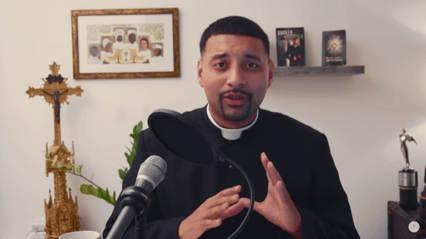There are I remember instances of spending hours hovering over Excel spreadsheets, calculating my budget and projected income, considering ways to make more money, re-evaluating my purchasing decisions, and worrying about my savings. There I was, worried about how I was going to pay for graduate school, take care of rent and all of my other expenses (while still having at least some money to occasionally eat out with friends). I was worrying—obsessively—and trying to control a situation that, to a certain extent, was beyond my control. How was I going to make this work? What would I do if I lost a certain amount of income? I was navigating all of these hypotheticals without doing what I should have done from the start: making room for Jesus.
Worrying about money can easily take over my life. I think it can for most of us.
How much do I save? Should I spend more on this? How will we pay for kid’s college tuition one day? How much is my spouse spending? Should I make cuts and just invest more into loans? Is this a good investment for the family? Will I ever be able to save more than I am right now?
We can have too much or too little and it will always haunt us. Which is probably why we hold so close to it.
It is funny how certain areas of our lives are easier to allow Jesus into than others. At least for me, when it comes to career, relationships, and passions, I can loosen my grip. But when it comes to things like my finances, it’s another story.
And while it’s good to be responsible, organized, future-thinking, and prudent when it comes to finances, in my case, it was disturbing the peace I’m called to have in Christ.
When things changed last year and got tough—as they did for many of us—I became resistant, trying to force those financial goals I had laboured so painstakingly over into reality. I was trying to control my financial situation as opposed to giving it over to Jesus. I wasn’t sitting in prayer and simply asking: Lord, can you help me with this? All that you’ve given me is a gift, so how are you calling me to earn money and spend money in accordance with your will?
We can get so scared that by offering it up to God, He is going to take it away or make us give it all away. But is that really the character of God?
We have to remember His promises. “Look at the birds of the air; they do not sow or reap or store away in barns, and yet your heavenly Father feeds them. Are you not much more valuable than they?” (Matthew 6:36) Really, He just wants us to ask for help. He wants us to be willing.
The more I prayed like this—open-handed with my finances and believing God wants good for me—the more peace I received. Plus, the more I was able to discern how the Lord was asking me to be a good steward of my financial gifts.
How Do We Know If We Are Doing It Right?
It’s easy to get caught up in logistics too. How much do I give? Is this enough? Am I being selfish? Or does it even matter whether I get a large coffee or small?
To start, it’s important to ask Jesus in prayer how He would like us to use our financial gifts to help others. Jesus praised the widow who offered what little she had. He instructed the rich man to give all he had to the poor and follow Him. In other words, sharing our material and financial gifts is important. And if we are disciples of Christ and blessed with enough income to meet our basic needs then we should be asking the Lord to show us how He wants us to share our financial gifts with our neighbour.
But I think the Lord wants us to be mindful and intentional about what we share and to whom. Yes, He wants us to give generously—but also prudently and with a discerning heart.
For example, perhaps we have a heart for children and want to support nonprofits and ministries that work in this area. Perhaps we feel that bringing the truth and beauty of the faith to the world is important and feel called to support Catholic institutions of higher learning or publications. Or, closer to home—perhaps we have friends or family members who are struggling that we may be called to aid more directly.
God may be asking us not simply to give—and we should always ask God to give us the grace to want to give more generously—but to also consider where to give. By making room for Jesus in our finances, we can better ask: Lord, I want to offer some of my financial gifts for your purposes. Please help me discover how much I’m called to give and to whom.
It’s easy to think we’ve done what we can here. To mark it off our list and know we’ve put the right effort in (I know I have in the past). As long as we’re donating money, we are, in effect, making room for Jesus in our finances. In fact, we might be tempted to think, Well, I’m already giving to others and so the rest of my money is now mine to spend as I please.
But making room for Jesus in our finances means making room for all of our financial decisions. This is where, again, prayer is vital.
Specifically, we could adopt a daily examen, in which at the end of each day, in addition to reviewing our blessings and fallings for that day, we also review our spending decisions. Did we spend extravagantly? Are we being prudent in saving money for the future? Are we allowing our purchasing decision to nurture our vocations and callings?
Using Resources Alongside Prayers
It can help by incorporating certain tools. I'm not the most organized person in the world but I do try to check in consistently to see what my spending has been like. What do I need to change? Am I spending more or less than I think? What are some things to be proud of as well as areas of improvement?
And I do this with basic tools that I rely on for lots of areas of my life: Google spreadsheet, calendar reminders, and so on. These serve as reminders and tools that allow me to prayerfully consider my spending at regular intervals and reevaluate my goals. To ask myself: Am I spending in accordance with my intentions? Do I need to be more generous? Am I being a good steward of what I have been given?
They can also help us with our larger discernment issues.
For example, we may discern that in order to pursue our vocation that we need to take out loans and go into debt for school. But that would be very different than unreflectively racking up credit card debt, telling ourselves that we “need” the newest model car or the latest iPhone.
If we have a large family, we may realize that we’re called to save more money than if we are single and in a position to give away more and save less.
Or we may spend money on a vacation with our family, allowing us to bond with our loved ones, be rejuvenated by the natural beauty and be reminded that we are not made for only working—all wonderful blessings! But how we decide to spend our money to achieve such things on a vacation can vary greatly—and may border on extravagance or irresponsibility depending on our situation and state in life.
The point? Our financial decision will vary for each of us since we are each called to different levels of sacrifice and stewardship. Some are called to a radical level of poverty—like that of St. Francis—and many are not. There is no simple equation. But we can gain guidance by praying to Jesus and asking Him to show us His will. Bring every decision to Him—the big ones and the little ones. No matter our particular calling, we are always called to be good stewards of our financial gifts and to love others as ourselves with those gifts.
As I’ve started to make more room for Jesus in my own finances, I’ve noticed I have more peace. I still worry at times, become a little too singularly focused on reaching certain goals and, if I’m honest, don’t always spend my money as prudent as I should. But the continual practice of surrendering this area of my life is forming me. And the more I pray and ask for Jesus to help me, the more I’m able to let Him steer my financial gifts and planning for His purposes.
How are you making room in your finances right now? Is there an area you think God is asking you to reconsider?



